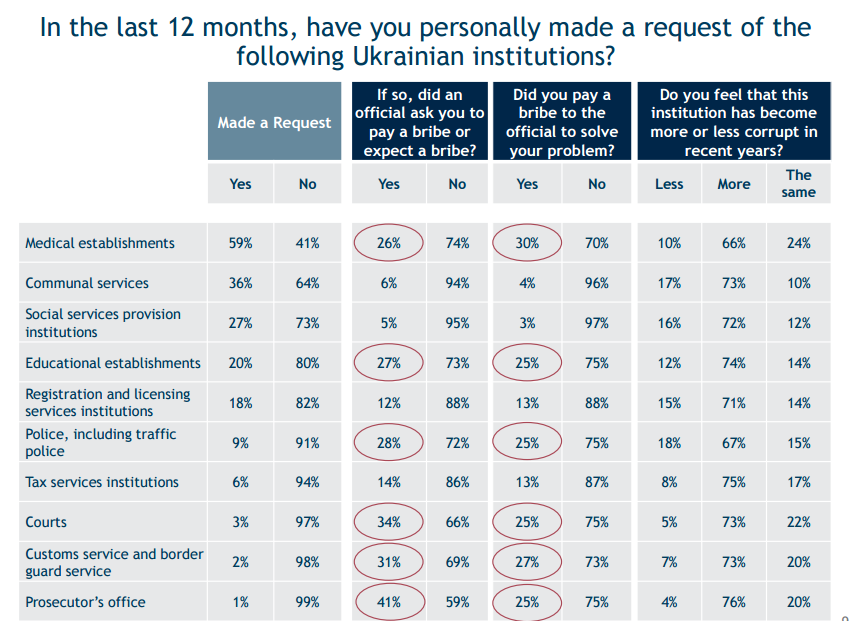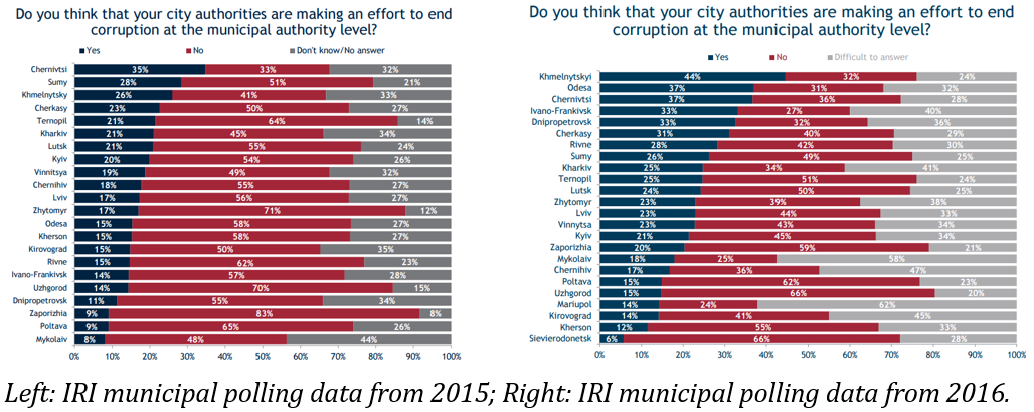It’s Time to Double Down on Anti-Corruption Efforts at the Local Level
The International Republican Institute’s (IRI) latest poll on Ukraine includes some figures on corruption that may seem shocking those unacquainted with the country. For example, one quarter of respondents who visited a medical establishment over the last 12 months were asked to pay a bribe.
Yet this is hardly surprising to those who follow the events in Ukraine closely. It is no secret that Ukraine suffers from endemic corruption, which the Ukrainian people know better than anyone. Corruption continues to be one of the primary issues of public concern in Ukraine (in addition to the war in the Donbas), and calls for robust anti-corruption reform have continued in the wake of the 2014 Revolution of Dignity.
Demands for reform are understandable, given the magnitude of the problem. Nearly three-quarters of Ukrainians believe that the court system is more corrupt now than it has been in recent years. And the problem isn’t just on the national level. IRI’s municipal data indicates that overwhelming majorities in 22 of Ukraine’s largest cities believe that corruption is a serious problem.

Despite these daunting figures, considerable progress is being made. The adoption of the online procurement system, ProZorro, by national and local governments in 2015 has dramatically reduced corruption in the state tendering processes by bringing transparency to a once-opaque system. The new system has been praised for already saving Ukrainian taxpayers millions of dollars—a notable success considering that an estimated $2.3 billion was lost annually to corruption in public procurement each year. Similarly, Ukraine’s newly-outfitted patrol police in several major cities contributed to considerable improvements in public approval of police activities. These young officers have pledged to refuse bribes, and are working to reform Ukraine’s law enforcement sector from the inside-out.
Advancements have also been made in Ukraine’s housing sector. Citizens are opting in greater numbers to form private housing associations, known as “OSBB,” and are signing up for private or communal property management services instead of relying on the existing ZhEK system—an antiquated and often corrupt Soviet institution created to provide basic repairs and maintenance to Ukraine’s residential buildings. The mismanagement of the ZhEKs, as well as its failure to adequately respond to the needs of dues-paying residents, resulted in the emergence of increasingly popular alternatives that also provide a promising model for local self-governance in Ukrainian cities.
These reforms and others stand to dramatically improve the quality of life for citizens at the local level. From the use of e-petitions to participatory budgeting, Ukrainian local authorities are taking steps to become more transparent and accountable to their constituents. What’s more, Ukrainians have begun to notice. IRI municipal polling data from earlier this year revealed that a growing number of citizens believe that their city authorities are working to end corruption in their communities—a modest increase since the previous year, but an increase nevertheless.

Although there is little doubt that much work remains to be done, the international community should seek to capitalize on this momentum at the local level. As local government and institutions such as schools and administrative services are often the primary touchpoints for citizen-government interaction, we must reconsider the importance of local anti-corruption initiatives as an integral part of our governance support within the country. Corruption at the local level often manifests through poor service delivery and high administrative costs, as the example of ZhEKS illustrated, leaving many cities across the country vulnerable to corruption and frustrated with their government.
These issues will only intensify as decentralization reform continues to develop in Ukraine. The success of decentralization will in part rest on the ability of local governments to be responsive to citizen needs and build trust in government institutions and the decentralization process.
While reducing corruption at the local level will strengthen the potential for the success of decentralization, it will also bolster the democratic capacity of local government actors. Local government is often the incubator of new ideas and leaders, and investing in the integrity of public officials at the local level has a spillover effect as these leaders rise to higher levels of government or greater positions of power within their political parties.
Similarly, as citizens come to expect transparent and accountable governance at the local level, there will be upward pressure to encourage improved integrity practices at higher levels of government. While working on anti-corruption on the local level may lack the broad appeal of a trendy national-level reform, it is an essential building block of successful decentralization reform and reestablishing trust in government.
There are a number of pathways available for addressing corruption on the local level, including legal reform and strengthened law enforcement initiatives. IRI has chosen to cooperatively develop anti-corruption strategies with local officials, building off the organization’s long history in the country and working with political parties at the national and local level.
Through our Vulnerabilities to Corruption Assessment process, IRI works with local officials and civic activists to identify and map vulnerabilities to corruption within government processes and institutions. By engaging with local government officials as partners in the reform process, we are able to demonstrate the democratic and political values of corruption mitigation, while simultaneously supporting the implementation of transparency and accountability practices.
IRI has seen success with this process in several countries already, including Mongolia and Indonesia. Ukraine-based assessments have been conducted (or are underway) in Mykolaiv, Chernivtsi, and Ivano-Frankivsk, and are helping to establish a roadmap for corruption mitigation activities in these cities.
Top